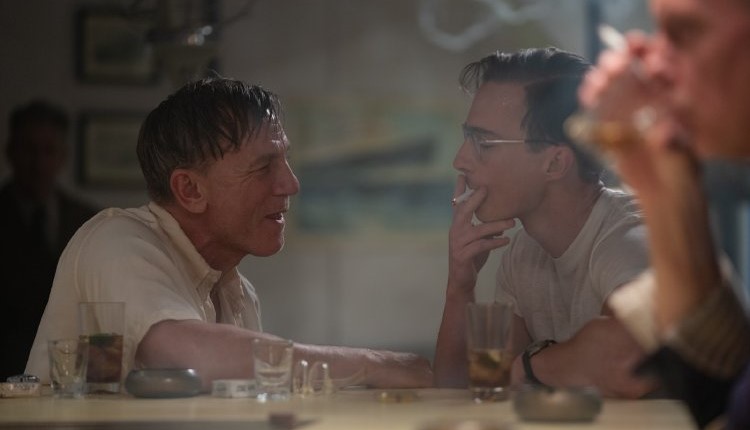Queer

Ex-pat American William Lee (Daniel Craig) spends his time drinking and cruising the bars of his Mexico City neighborhood. While one night stands scratch an immediate itch, they don't fulfill Bill's need for emotional connection, something that will be held tantalizing within reach by Eugene Allerton (Drew Starkey, "Love, Simon," TV's 'Outer Banks'), a former soldier from Oklahoma who says he's not "Queer."
Laura's Review: A-
Working with an adaptation of William S. Burroughs' last published novel by his "Challengers'" scribe Justin Kuritzkes, director Luca Guadagnino ("Call Me By Your Name") has elicited a powerhouse performance from Daniel Craig that is romantic desire personified. The film, shot largely at Cinecittà Studios in Rome, is an often surreal experience, production designer Stefano Baisi creating a dreamy, artificial atmosphere, marine blue night skies dotted with stars, all softly lit by "Challengers'" cinematographer Sayombhu Mukdeeprom. Trent Reznor and Atticus Ross contribute with a bell-like score that often seems tailored for a fairy tale while the soundtrack features anachronistic selections from Nirvana, Prince and New Order.
The film is divided into three chapters of unequal length, wrapping with a heartbreaking epilogue. The first chapter, 'How Do You Like Mexico?,' establishes Bill's lonely lifestyle as he wanders the streets in his cream colored three piece suit, his typewriter sitting in his apartment unused while his friend Joe Guidry (Jason Schwartzman) laments the loss of his, the latest item stolen by the string of wrong men he hooks up with. Bill first lays eyes on Eugene in the street, a boisterous cockfight taking up the street between them. We can see he is instantly smitten, but when he spies the young man in his regular bar, the Ship Ahoy, he's deflated to see him joined by Mary (Andra Ursuta), another regular. The next time he sees Allerton alone, he'll make a drunken, sweeping bow from across the room and eventually his interest is rewarded, Gene spending time with him, but always keeping him at arm's length. Bill cannot tell if Gene is homosexual ('Just ask him,' advises Joe), but hope springs eternal. Then Allerton asks 'Green Lantern Boy' John Dumé (Drew Droege), the least swishy of his clique, to give him a tour of the local gay bars. This inspires Bill to become more direct with Eugene, who claims to have never entered a gay bar in the States, but agrees when Bill asks him back to his apartment and enters his bedroom when invited.
The second chapter, "Travelling Companions," follows the two after Bill makes a generous offer to Eugene to accompany him to South America in search of a plant rumored to intensity telepathy. He's in the doghouse with Eugene, having cornered him while drunk at a party after Allerton had cooled, so offers to not only pay his way, but to provide a round trip ticket so that Eugene may depart whenever he desires, only requesting Gene 'be nice' to him a couple of times a week. Bill will go through withdrawal along the way, securing an opiate prescription from a doctor when he admits to being an addict. A local botanical garden scientist tells him he cannot help him, referring him to an American deep in the jungle who might. That would be Doctor Cotter (Lesley Manville, looking like a life-sized shrunken head), who guards her hut with a viper and lives with a younger man ("Jauja" director Lisandro Alonso).
The first chapter's stylized colors and dreamscape backdrops are replaced with more realistic settings in the second and third, 'The Botanist in the Jungle,' but the superimpositions Guadagnino used to visualize Bill's desired actions versus his actual ones become something much trippier when Bill and Eugene indulge in that mystical plant, their bodies literally merging in an orgiastic celebration, a phantasmagorical depiction of intense lovemaking which begins with each vomiting up his beating heart. But the next day, Eugene is ready to leave. 'What are you afraid of?' asks Cotter, 'You should have seen yourself last night,' recognizing what he appears to refuse to. The film's 'twenty years later' epilogue finds Bill flung through the heavens to land in his usual attire on a Mexican beach. The final scene is spiritual and haunting, suggesting Bill has attained his telepathic powers.
"Queer" has echoes of Cronenberg's "Naked Lunch" adaptation and even "Apocalypse Now," and yet it is its own unique creation.
"Queer" leaves us wondering if Craig is a frustrated Southerner after his roles in "Lucky Logan," "Knives Out" and now this, but this is no caricature, his performance vulnerable and heartfelt. Guadagnino had been building a filmography exploring gay relationships, but if "Call Me By Your Name" reflected the pangs of first love ended, "Queer" plunges us into the heartbreak of unrequited adult love.
Robin's Review: B
A24 released "Queer" in select theaters on 11/27/24, expanding in subsequent weeks.

